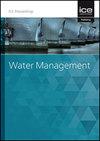Equation for localized time-dependent scour at pier-like structures with eccentric inline arrangements
IF 0.9
4区 工程技术
Q3 ENGINEERING, CIVIL
Proceedings of the Institution of Civil Engineers-Water Management
Pub Date : 2023-09-19
DOI:10.1680/jwama.23.00006
引用次数: 0
Abstract
Excess scour developing around tandem and eccentric piers of side-by-side bridges may aggravate bridge failure. Thinking differently, this kind of pier-like structure combination may increase scour and shift sediments towards the bank which may help in self-dredging. Therefore, accurate estimation of temporal scour depth (d st ) around such piers is getting the utmost priority nowadays. However, very little work has been done in this regard. Most of the previous equations predict d st only for isolated pier. In the present study, 2-3 piers were placed eccentrically inline in addition to isolated piers to empirically derive equations for accurately predicting d st considering circular, triangular and square pier shapes. Present experimental results for isolated circular pier are validated using literature equations and also cross-validated with other literatures experimental data. Predictive equations are proposed for 2-3 piers with eccentrically inline arrangements, taking their intermediate spacing's as key variables. These equations are established based on dimensional analysis and non-linear regression. Overall analysis reveals that the estimated temporal scour depths based on the proposed integrated equation are closely within the ±80% accuracy band. The proposed equations can be used to accurately predict temporal scour for selected combinations of piers within the given experimental ranges.偏心排列的类墩结构局部时效冲刷方程
并排式桥梁的串连墩和偏心墩周围过度冲刷会加剧桥梁的破坏。换句话说,这种桩状结构组合可能会增加冲刷并将沉积物移向河岸,这可能有助于自疏浚。因此,准确估算此类桥墩周围冲刷深度(d st)已成为当前最重要的问题。然而,在这方面所做的工作很少。以往的方程大多只对孤立桥墩进行预测。在本研究中,除了孤立的桥墩外,还将2-3个桥墩偏心内线放置,以经验推导出考虑圆形、三角形和方形桥墩形状的准确预测st的方程。本文的实验结果采用文献方程进行了验证,并与其他文献的实验数据进行了交叉验证。以中间间距为关键变量,建立了2-3个偏心线列桥墩的预测方程。这些方程是基于量纲分析和非线性回归建立的。综合分析表明,基于该积分方程估算的时间冲刷深度精度在±80%以内。所提出的方程可用于在给定的实验范围内准确预测所选桥墩组合的时间冲刷。
本文章由计算机程序翻译,如有差异,请以英文原文为准。
求助全文
约1分钟内获得全文
求助全文
来源期刊
CiteScore
2.10
自引率
0.00%
发文量
28
审稿时长
6-12 weeks
期刊介绍:
Water Management publishes papers on all aspects of water treatment, water supply, river, wetland and catchment management, inland waterways and urban regeneration.
Topics covered: applied fluid dynamics and water (including supply, treatment and sewerage) and river engineering; together with the increasingly important fields of wetland and catchment management, groundwater and contaminated land, waterfront development and urban regeneration. The scope also covers hydroinformatics tools, risk and uncertainty methods, as well as environmental, social and economic issues relating to sustainable development.

 求助内容:
求助内容: 应助结果提醒方式:
应助结果提醒方式:


